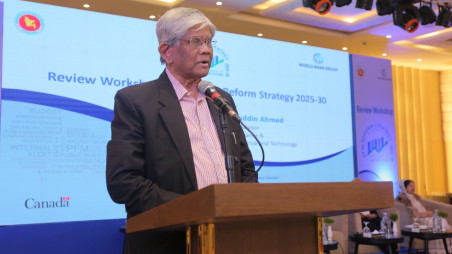Staff Correspondent
Published:2024-11-30 00:08:40 BdST
FA calls for inclusive public financial management reform
Finance Adviser Salehuddin Ahmed has emphasised the need for a triangular approach to public financial management (PFM), integrating the efforts of the public and private sectors, and citizens to ensure efficient, transparent, and accountable financial services.
Speaking as the chief guest at the Review Workshop on the 3rd PFM Reform Strategy 2025–2030, the adviser said, “In our country, the main bottleneck is the institution itself. We have good programs and plans, but we must focus on implementation by aligning these with our institutional capacity and commitment.”
Salehuddin stressed that the upcoming reform strategy should be straightforward, actionable, and tailored to address Bangladesh's unique challenges, read a press release on Friday.
The workshop, organised by the Finance Division with support from the World Bank, aimed to finalise technical notes based on insights gathered from 31 consultation workshops held in recent months.
Senior officials from the Finance Division, representatives from the World Bank and other development partners participated in the event.
Presided over by Md Khairuzzaman Mozumder, Secretary of the Ministry of Finance, the workshop was addressed by Bilquis Jahan Rimi, Additional Secretary (Budget-1) and National Program Director, Strengthen Public Financial Management Program to Enable Service Delivery (SPFMS), Finance Division, and Suraiya Zannath, Lead Governance Specialist (Financial Management), the World Bank.
Highlighting the government’s achievements in public financial reform, Khairuzzaman pointed out how automation in salary disbursement and pension management has enhanced efficiency and transparency.
“For instance, electronic fund transfers now ensure that salaries reach employees on the first day of each month, which used to take 8–9 days. Similarly, the pension management system has been automated, eliminating delays and ensuring life verification. These reforms have expanded into private domains, such as the Government-to-Person (G2P) payment system, which supports corruption-free social safety net programs,” he said.
The PFM is pivotal to Bangladesh's vision of achieving fiscal discipline, macroeconomic stability, and sustainable development. It provides a framework for strategic resource allocation across agriculture, industrialisation, and services to drive inclusive growth.
As Bangladesh prepares its 3rd PFM Reform Strategy, it is essential to identify gaps in previous reforms and reflect on the effective use of public funds, read the release.
This requires sequencing reforms into three types – process reforms for efficiency, structural reforms for modernisation, and institutional reforms for strong governance. Adapting global best practices while considering Bangladesh’s unique context is the key.
The inclusion of a clear action plan within the strategy will ensure cost-effectiveness, clarity, and better implementation. Ownership and commitment to this strategy are crucial, as they represent a shared responsibility to manage public resources equitably and effectively for all citizens.
With unity and determination, Bangladesh can build a robust PFM system that supports a prosperous and sustainable future.
Unauthorized use or reproduction of The Finance Today content for commercial purposes is strictly prohibited.


